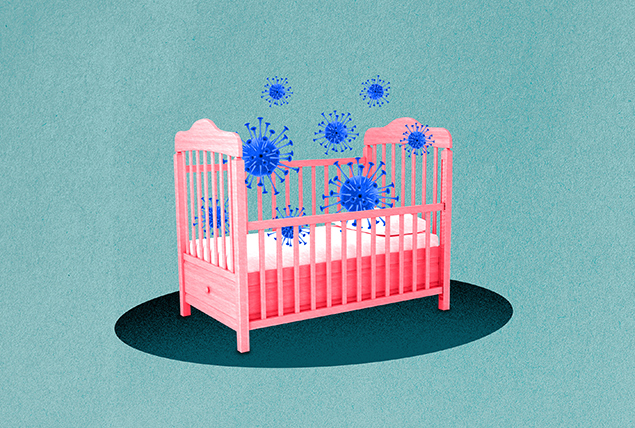Babies Born With Syphilis on the Rise in Mississippi

The rate of infants born with congenital syphilis increased significantly in the past decade, alarming some experts in Mississippi and elsewhere.
"Unbelievable that babies [are] dying from syphilis in 2023!" said Thomas Dobbs, M.D., the former state health officer for the Mississippi State Department of Health, in a Jan. 25 tweet.
Mississippi, the poorest state in the United States, also has the worst infant mortality rates in the country.
Congenital syphilis occurs when the sexually transmitted disease (STD) is spread from mother to infant during pregnancy.
The buzz around the public health issue began in late January when Dobbs, the dean for the School of Population Health at the University of Mississippi Medical Center, shared alarming data with his followers on Twitter. The state health department has yet to publish its latest data on the disease.
The data showed a dramatic increase in the rate of infants being born in Mississippi with the STD. In 2016, eight newborns were treated for congenital syphilis, according to hospital billing data analyzed by Dobbs and state epidemiologists Paul Byers, M.D., and Manuela Staneva, M.P.H. By 2021, that number rose to 106 syphilis-infected infants, a 13-fold increase.
Dobbs' tweet suggested the state's public health dilemma is preventable.
"We need doctors, patients, insurance [Medicaid] and public health to work together," Dobbs tweeted, tagging the state health agency and the Centers for Disease Control and Prevention (CDC). "This is a simple problem to eradicate—if we so [choose]. Early testing/treatment/prenatal care."
Symptoms of syphilis
Mothers who contract syphilis before or during pregnancy are at high risk of spreading it to their infants. The disease can cause birth defects and, at its worst, death, in newborns.
Symptoms may be difficult to spot because they vary greatly depending on the patient's age and the stage of the illness.
In some cases, a newborn child may initially be asymptomatic, showing zero signs of the STD. In women, the primary syphilis infection—secondary and tertiary stages can follow—typically presents itself as a sore or multiple sores near the genitals, rectum or oral cavity; wherever the bacteria makes contact with the mother.
Syphilis sores are usually firm, round and painless, according to the CDC.
Fever, swollen lymph nodes, skin rash and wart-like genital lesions are most commonly associated with secondary syphilis. In the third stage of the illness, in the absence of treatment, more serious medical problems that can affect the heart, brain and other organs may develop.
Effects on infants
The disease can cause long-lasting damage to newborns if left undiagnosed or untreated.
"Infants might be born without clinical signs of syphilis but go on to develop late-stage manifestations of untreated congenital syphilis that include developmental delay, neurologic manifestations and late congenital syphilis physical signs," the CDC states.
Common symptoms of early congenital syphilis in newborns include rhinitis ("snuffles"), an enlarged liver or spleen, skin rash with peeling skin, inflammation of the lining of the retina, glaucoma, cataracts, optic neuritis, periostitis and anemia, among other symptoms.
Some symptoms of congenital syphilis may be detected, and possibly treated, in vitro if mothers are screened early.
"Infants who remain undiagnosed and untreated can progress to late congenital syphilis, resulting in numerous additional clinical manifestations, including, but not limited to: saddle nose due to destruction of cartilage, frontal bossing due to periostitis, tibial thickening (saber shins), joint swelling (Clutton joints), perforation of hard palate, abnormal tooth development (Hutchinson's teeth, mulberry molars), interstitial keratitis, neurologic deafness and optic atrophy," according to the CDC.
A costly problem
Preliminary CDC congenital syphilis figures mirror the outbreak taking place in Mississippi, possibly pointing to a greater problem nationwide.
Between 2017 and 2021, congenital syphilis cases among infants nearly tripled, rising from 941 cases in 2017 to 2,677 in 2021, according to CDC data.
Dobbs shared the economic impact of such an STD problem on Twitter.
"Also—it is very expensive!" he tweeted. "Infants with congenital syphilis had a five times higher mean length of stay (15.8 days vs. 3.7 days) and over three times higher mean hospital charges ($59,416 vs. $13,783) than infants without such a diagnosis."
It should be noted: Mississippi's infant healthcare is some of the most expensive newborn medical care in the country, according to a 2021 report from insurance giant United Healthcare.
The Mississippi State Department of Health and Dobbs did not immediately respond to requests for comment on Feb. 14.


















